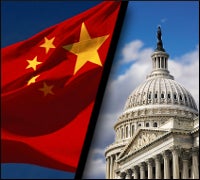 |
Chinese officials had a lightning-fast response to Secretary of State Hillary Clinton’s speech — challenging her on claims that it wrongfully limited its citizens’ access to the Internet and blasting her for “attacking China.”
During her Thursday speech, Clinton criticized China’s censorship policies, among those of other countries. Though long-planned, the talk included references to the recent dust-up between Google (NASDAQ: GOOG) and China over the latter’s censorship policies.
Google said last week that it plans to stop adhering to the censorship policies and may drop out of the country altogether if an agreement can’t be worked out.
“China’s Internet is open,” Foreign Ministry spokesperson Ma Zhaoxu said in a statement posted on the Chinese consulate’s English-language Web site. “China’s Constitution guarantees people’s freedom of speech. It is China’s consistent policy to promote the development of Internet. [sic] China has its own national conditions and cultural traditions. It supervises Internet according to law, which is in parallel with the international practice.”
“We urge the U.S. to respect facts and stop attacking China under the excuse of the so-called freedom of Internet,” Ma said, adding he hoped the two countries can work together to handle their differences and strengthen their relationship.
Analyst Tim Bajarin said the reaction was unusually fast.
“But in this age of quick information distribution, they really had no choice but to say something to clarify their position,” Bajarin, president of Creative Strategies, told InternetNews.com. “I wouldn’t call it a surprise, but the only thing that caught my attention in their statement was saying China’s Internet is open. They didn’t address their own censorship policies directly, though I didn’t expect they would.”
The Chinese newspaper Global Times went well beyond Ma’s statement in its own criticism of Clinton’s speech.
“‘We stand for a single Internet where all of humanity has equal access to knowledge and ideas.’ Clinton’s words may sound perfectly right to some in the West, but would be regarded as a new threat by people in other parts of the world,” said the Global Times.
“The U.S. campaign for uncensored and free flow of information on an unrestricted Internet is a disguised attempt to impose its values on other cultures in the name of democracy,” it added. “The hard fact that Clinton has failed to highlight in her speech is that bulk of the information flowing from the U.S. and other Western countries is loaded with aggressive rhetoric against those countries that do not follow their lead.”
Clinton’s speech went well beyond the China/Google brouhaha, covering the Haiti earthquake crisis and the broader issue of open access to information on the Internet globally.
During her speech, Clinton said in part that “… technologies with the potential to open up access to government and promote transparency can also be hijacked by governments to crush dissent and deny human rights.”
More specifically, she noted that in the past year there has been “a spike in threats to the free flow of information. China, Tunisia, and Uzbekistan have stepped up their censorship of the Internet. In Vietnam, access to popular social networking sites has suddenly disappeared. And last Friday in Egypt, 30 bloggers and activists were detained.”
On China, Clinton said the spread of Internet use throughout the country is “fabulous” and a sign of tremendous progress.
“There are so many people in China now online,” she said. “But countries that restrict free access to information or violate the basic rights of Internet users risk walling themselves off from the progress of the next century.”
Google, China and Internet freedom
In perhaps a not-so-veiled reference to the China/Google issue, she also said:
“For companies, this issue is about more than claiming the moral high ground. It really comes down to the trust between firms and their customers.”
“Consumers everywhere want to have confidence that the Internet companies they rely on will provide comprehensive search results and act as responsible stewards of their own personal information,” Clinton added.
Similarly, she seemed to voice support for Google’s decision to stand up to China and encouraged other firms to follow suit.
“Increasingly, U.S. companies are making the issue of Internet and information freedom a greater consideration in their business decisions. I hope that their competitors and foreign governments will pay close attention to this trend.”
Creative Strategies’ Bajarin said he’d be “very surprised” if any companies of note followed Google’s lead. At the same time, he suspects Google is working very hard, as a pragmatic business matter, to work out a way stay in China.
“I applaud them for taking a stand,” he said. “But China is an incredibly large audience with great financial potential and every company doing business there has to weigh any decision to leave very carefully.”
David Needle is the West Coast bureau chief at InternetNews.com, the news service of Internet.com, the network for technology professionals.


